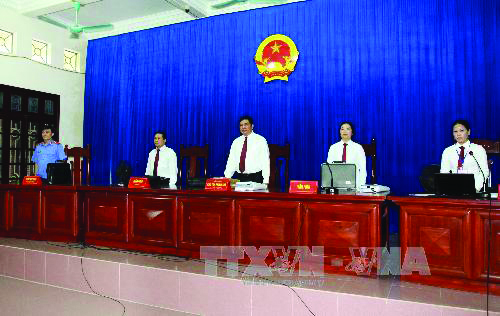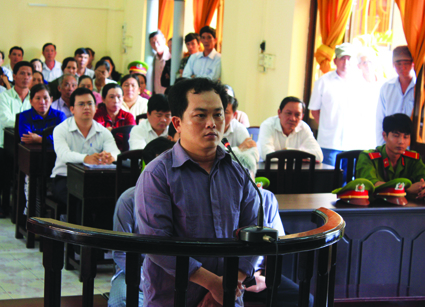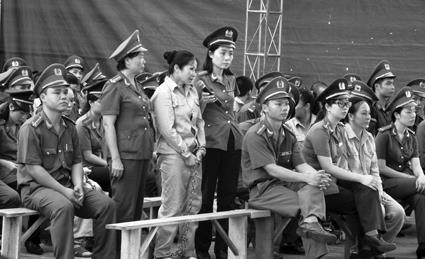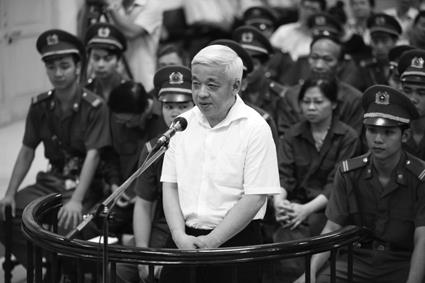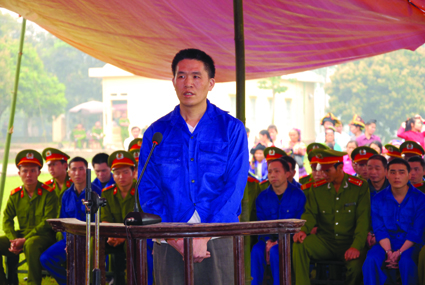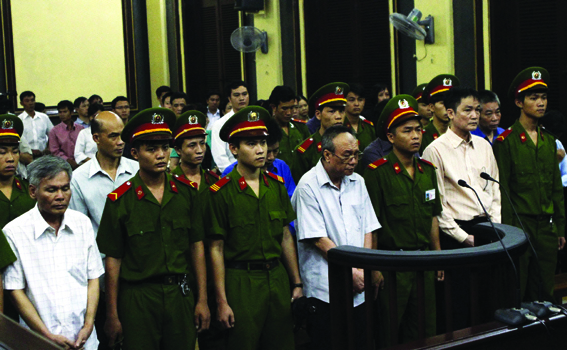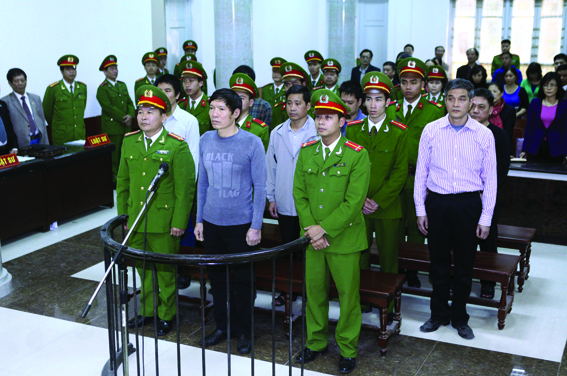Thai Chi Binh, LL.M
People’s Court of Chau Doc city,
An Giang province
Definition of summary procedures
In criminal justice, different crimes are subject to different criminal procedures in order to meet the requirements of the crime prevention and combat and to protect in time the lawful rights and interests of citizens.
At present, there are different viewpoints on summary procedures. However, these viewpoints have the following points in common: Summary procedures are special criminal procedures without certain procedural steps as compared to the general procedures; these procedures uphold the general principles of the criminal procedure but aim to facilitate swift investigation, prosecution and adjudication; they are applicable only under certain conditions prescribed by the Criminal Procedure Code (the Code); and their application must ensure the lawful rights and interests of persons held in custody, the accused, defendants and other procedure participants.
 |
| Vissai Ninh Binh soccer players stand trial for match-fixing__Photo: Van Dat/VNA |
From the above definition, connotation and significance of summary procedures, we believe that it is necessary to add the definition of summary procedures in the Code in order to provide a consistent interpretation as well as a ground for stipulating in detail the application of these procedures.
Scope of application of summary procedures
According to Article 318 of the Code, summary procedures may be applied only in the stages of investigation, prosecution and first-instance trial. Regarding the application of summary procedures to appellate trial, divergent opinions have been raised in practice. The first type of opinion holds that the application of summary procedures in an appellate hearing would contradict the nature of appellate trials which requires review of a tried case and the trend of democratization of criminal justice in light of Resolution No. 08-NQ/TW[1] on promoting the adversary process at court hearings. The second type of opinion finds it necessary to expand the application of summary procedures to appellate trial for the following reasons: (1) the fact that the first-instance judgment is appealed or protested against does not make the case more complicated as the application of summary procedures must have been carefully considered before it was decided; (2) the application of summary procedures must satisfy certain conditions. The procedure-conducting agency must cease the application of summary procedures if there is a reason for non-application in the first-instance trial; and (3) in case the first-instance court makes an error in the application of law, it would not take much time for the appellate court to correct such error. In case a serious violation of criminal procedure is committed, the appellate court may quash the judgment and settle the case according to the general procedures.
In our opinion, non-application of summary procedures in appellate trial has compromised the significance and purpose of summary procedures.
Besides, from the reality of settlement of criminal cases according to summary procedures as well as settlement of cases of less serious crimes in which offenders are caught red-handed according to general procedures, we have found that in many of these cases defendants only appealed for lighter penalties or victims appealed for heavier penalties against offenders largely because of their resentment toward crimes. They often could not provide additional documents or evidences to back up their appeals. When considering such appeals, appellate courts are not required to review circumstances of the cases but need to reconsider only the application of law by first-instance courts. The non-application of summary procedures in appellate trial of these cases is unreasonable. When summary procedures are applied in appellate trial, the conditions specified in Article 319 of the Code must also be met.
On the other hand, summary procedures should not be applied in the appellate trial of all cases which have been adjudicated according to these procedures. In addition to appeals, there may be protests of procuracies that disagree with courts on the application of substantive laws or find that courts violate criminal procedures in the trial and weighing of circumstances and evidences of cases. Cases in which new circumstances emerge after the first-instance hearing which affect rulings made by the first-instance court; or the court has tried the case based on a clause different from that applied by the procuracy for prosecution or charged a less serious crime within the trial limit prescribed in Article 196 of the Code; or defendants or victims disagree with the court’s considerations, should not be retried according to summary procedures.
So, in order to improve the effectiveness of summary procedures in criminal justice, it is necessary to expand the application of these procedures to appellate trial. However, to prevent abuse of these procedures, their application in appellate trial must satisfy certain conditions.
Conditions for application of summary procedures
According to Article 319 of the Code, summary procedures may be applied only when the following conditions are fully met: (1) persons committing criminal acts are caught red-handed; (2) crimes are simple with obvious evidences; (3) committed crimes are less serious ones; and (4) offenders have clear personal identities and backgrounds. However, these conditions have shown some limitations through practical application:
Discretionary application
Clause 1, Article 320 of the Code stipulates: “After criminal cases are instituted, at the request of investigating agencies or if deeming that the cases fully meet the conditions prescribed in Article 319 of this Code, procuracies may issue decisions to apply summary procedures.” As per this provision, whether or not the summary procedures are applied depends on decision of procedure-conducting agencies. It is necessary to prescribe compulsory application of summary procedures by procedure-conducting agencies rather than discretionary application under Article 319 and Clause 1, Article 320 of the Code.
Specific conditions
“Persons committing criminal acts are caught red-handed”
In practice, there are many cases where an offender is not caught under urgent arrest and his crime is simple to investigate and it is easy to verify and assess circumstances and evidences of the case; or where an offender turns himself in and his crime is simple and less serious with obvious evidences. However, such cases are ineligible for application of summary procedures due to lack of the condition that the offender is caught red-handed. Summary procedures should be also applied in these cases provided other conditions are met.
“Crimes are simple with obvious evidences”
In our opinion, a “simple” crime can be understood as a crime committed by only one person or with some accomplices but it is easy to judge its nature and degree of danger to the society. At the same time, it does not involve complicated circumstances and suspects or is not an organized one, and the case does not involve multiple crimes or is committed in only one field or in a narrow domain. “Obvious evidences” are those sufficient for proving circumstances specified in Article 63 of the Code and other related matters such as civil matters in criminal cases, handling of exhibits and application of judicial measures. At the same time, pieces of evidence must not be contradictory and no more time is needed for examining and summarizing documents in case files or opinions of professional agencies are not required. The above explanation should be added in Clause 2 of Article 319 for consistent application.
“Committed crimes are less serious ones”
We find it absolutely feasible to apply summary procedures to the settlement of cases involving serious crimes because the quick and just settlement depends on the simplicity and obviousness of circumstances rather than the degree of danger of the crime. Moreover, in Vietnam crimes are categorized by the highest level of their penalty frames, not by the complexity of criminal acts. Therefore, it is necessary to apply summary procedures also to serious crimes.
“Offenders have clear personal identities and backgrounds”
We hold that personal identities and backgrounds in this condition should be understood as offenders’ personal identifications which are relevant to the incrimination of offenders, determination of penalties to be handed down and circumstances aggravating or extenuating their penal liability, significant to the penalty decision and usually different from case to case. To satisfy this condition, such relevant identifications must be proven while other personal identification information of offenders are not required to be verified. Personal identities and backgrounds of offenders should also be verified easily and swiftly in order to facilitate the quick settlement of cases. So, the condition “offenders have clear personal identities and background” should be added with “which can be clarified easily and swiftly.”
Decision to apply summary procedures
According to Clause 1, Article 320 of the Code, investigative agencies may request and procuracies are competent to decide on the application of summary procedures. Investigative agencies are responsible for collecting documents and evidences and hold the initiative in assessing the conditions for application of summary procedures. So, if they are vested with the power to decide on the application of summary procedures, they can be more proactive in conducting investigating activities. We suggest Clause 1, Article 320 of the Code be revised to empower investigative agencies to decide on the application of summary procedures and require procuracies to decide only when all the conditions are met but investigative agencies fail to do so.
Under Clause 1, Article 320, a decision on the application of summary procedures may be issued only when a case institution decision is in place. Meanwhile, Clause 2, Article 320 stipulates that a decision on application of summary procedures must be delivered to the accused or his/her lawful representative. This means that the delivery of the decision on application of summary procedures to the accused while the decision on accusation against him/her has not yet been issued is unreasonable. To address this, we propose Clause 1, Article 320 be revised to stipulate that investigative agencies must issue a case institution decision and a decision on accusation against a person involved in such case simultaneously. Only after procuracies approve accusation decisions can investigative agencies issue decisions on application of summary procedures. The time limit for the procuracy to approve an accusation decision should be 1 day after receiving a written request of the investigative agency.
Moreover, the application of summary procedures to settle cases would more or less affect the accused’s lawful rights and interests. It is therefore necessary to add in the Code the responsibility of agencies issuing decisions on application of summary procedures to explain the application of summary procedures as well as rights and obligations of the accused or their lawful representatives, especially the right to ask for defense, when serving such decisions to the accused or their lawful representatives.
Once investigative agencies are empowered to issue decisions on application of summary procedures, we also find it necessary to add in Articles 34 and 36 of the Code provisions that heads of investigative agencies are competent to apply summary procedures and that chief procurators of procuracies are competent to apply summary procedures when all the conditions for application of summary procedures are met but investigative agencies fail to apply them.
It is also necessary to add the power of investigative agencies to settle complaints about the application of summary procedures. The time limit for investigation according to summary procedures is 12 days under Clause 1, Article 321 of the Code. Meanwhile, according to Article 320, the time limit for filing and settlement of a complaint is 8 days, meaning the time left for investigation is only 4 days. Within this time limit, investigators can hardly meet all legal requirements on investigating activities. To address this problem, we suggest the time limit for filing and settlement of complaints no longer be counted into the investigation time limit.
Regarding switching from summary to general procedures, according to Clause 2, Article 323 of the Code, the cancellation of a decision on application of summary procedures for switch to general procedures may take place in the stage of prosecution when procuracies returns case files for additional investigation or suspend cases, and the cancellation is effective to all three stages of investigation, prosecution and trial. To facilitate the correction of errors in the assessment of grounds for application of summary procedures, we find it necessary to vest procedure-conducting agencies with the competence to cancel inappropriate decisions on application of summary procedures. At the same time, when a court hearing is adjourned, the adjournment period should not be counted into the total period of settlement of the case and the case is not required to switch to general procedures.
Currently, the time limits for investigation, prosecution and trial are 12, 4, and 14 days respectively. Within these time limits, only when aiding activities such as valuation, examination, making of excerpts of previous convictions and provision of information about the accused’s personal background are properly carried out, can summary procedures be applied. Besides, the emergence of new circumstances and no permission for the extension of these time limits can easily make the settlement of cases according to summary procedures switch to general procedures for reason of expiration of the settlement time limit. We, therefore, recommend longer time limits for investigation, prosecution and trial. Each stage’s time limit should also be extended once.
In addition, if summary procedures are not applied in the stage of investigation, procuracies and courts should have the power to decide on the application of these procedures in the stages of prosecution and trial, provided all conditions for the application are met.
Regarding the right to defense, Chapter 34 of the Code on summary procedures makes no mention on this issue. This means the right to defense of the accused and defendants must, in principle, follow general procedures, which cause difficulty to them or their lawful representatives in seeking defense within a short time limit. The application of summary procedures without offenders’ consent may also affect their rights and interests. To ensure offenders’ rights, the following provision should be added: When delivering decisions on application of summary procedures to the accused or defendants, competent agencies must explain the right to seek defense and guide them in exercising this right. If they cannot afford a defense counsel, the procedure-conducting person must request the bar association to appoint one for them.
Application of summary procedures in appellate trial
As analyzed above, the expansion of application of summary procedures to appellate hearings is quite necessary. To facilitate the application of summary procedures, some provisions relevant to appellate trial should be added to the Code.
First, time limits for lodging appeals and protests according to summary procedures should be shorter than those in general procedures, i.e. five days from the date when the first-instance judgment is pronounced or when the judgment is publicly posted in case of trial of the accused in absentia, for appeals and protests lodged by same-level procuracies, and seven days for appeals and protests by immediate higher-level procuracies.
Second, to reduce the time needed for settling a case, we suggest shorter time limits for trial preparation and opening of court hearings. Specifically, the time limit for preparation for appellate trial should be 20 days after the case file is received and the time limit for opening of an appellate hearing should be seven days after the opening of the court hearing is announced. One judge is also sufficient to conduct an appellate hearing according to summary procedures.
Third, the time for conducting an appellate hearing according to summary procedures should also be shortened. Accordingly, the questioning session should be skipped and the judge, after hearing opinions presented by the appellant and viewpoints by the procuracy, should promptly pronounce the judgment. The postponement of court hearings, as in cases where some summoned procedure participants are absent, should be limited.
Fourth, with the above proposed revisions, a case may be settled according to summary procedures by an appellate court only when the following conditions are met: the case has been tried according to summary procedures by a first-instance court; the conditions for application of summary procedures in the first-instance trial have been met; the circumstances of the case are clear and not contradictory to each other, the questions involved in the case have been answered and the offender has admitted his crime before the first-instance court; and an appeal or a protest is lodged to request a lighter penalty for the defendant or to adjust compensation to be paid or to request application of judicial measures or handling of material evidences.
Holding in custody or detention of persons for investigation and prosecution
First, as prescribed in Clause 2, Article 322 of the Code, the time limit for holding of a person in custody is three days and must not be extended. However, the 3-day time limit is not enough for investigators to assess the conditions for application of summary procedures after collecting documents and evidences, reference to previous conviction records, property valuation, etc. So, it should be stipulated that investigative agencies may extend the custody time limit once to have more time examining conditions for application of summary procedures.
Second, the Code does not specify any time limit for detention of a person for investigation and for prosecution, though Clause 3, Article 322 stipulates that the time limit for detention for both investigation and prosecution is 16 days. We hold that, because the conditions, competence and procedures for application of the measures of custody and detention according to summary procedures follow general procedures prescribed in Articles 80 and 88 of the Code, when a case is in the stage of investigation or prosecution, the time limit for detention should be 12 days or four days, respectively. Investigative agencies may not issue any order for detention for a period exceeding the investigation time limit. For this reason, Clause 3, Article 322 of the Code should be revised appropriately.
Third, according to general procedures, a procuracy must approve a detention order of an investigative agency within three days. This time limit should be shortened to one day to spare more time for investigation according to summary procedures (a total of 12 days including custody time).-
[1] Resolution No. 08-NQ/TW of January 1, 2002, of the Political Bureau of the Communist Party of Vietnam Central Committee, on a number of key tasks of justice work in the coming time.
